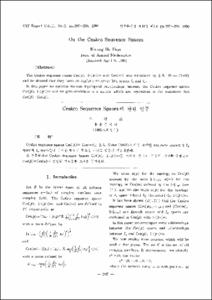고령화사회에 대비한 지방정부의 역할
- Alternative Title
- The Role of Local Government to Prepare for Aging Society
- Abstract
- 1960년대 경제개발5개년 계획으로 시작된 산업화ㆍ도시화 현상으로 나타난 새로운 가족 구성형태로 인해 제기되는 가장 심각한 문제로는 노인주거문제를 들 수 있다. 따라서 본 연구에서는 노인복지와 관련된 여러 가지 문제 중에서 핵가족화 현상과 고령화 사회의 도래로 접목되는 노인전용 주거시설의 개발 중 실버타운 조성을 중심으로 논의하고자 한다. 본 연구에서 연구하고자 하는 내용을 간략히 제시하면 다음과 같다. 첫째, '인구의 고령화' 라는 사회현상은 이와 관련된 새로운 행정수요를 야기시키고 있다. 고령화 사회도래와 함께 제기되는 행정수요의 변화에는 어떤 것이 있는 지 살펴보기로 한다. 둘째, 노인복지와 관련한 문제 중에서 사회현상과 가장 밀접하게 접목되는 노인 주거시설을 중심으로 살펴보고자 한다. 노인주거시설 중 많은 사람들의 관심을 집중시키고 있는 실버타운의 개념과 필요성에 대해 언급하기로 한다. 셋째, 실버타운에 대한 수요는 점차 증대되고 있는 실정인데 현재 우리 나라 실버타운의 현황과 문제점을 살펴보고, 이러한 수요를 노인복지차원에서 충족시키기 위한 지방정부의 역할에 대해 살펴보기로 한다.
The residential problem of elderly persons may be one of the most serious problems incurred from a new form of family structure which has appeared due to industrialization and urbanization initiated by the economy development plan in 1960s. Among various problems related with the welfare for elderly persons, the subject of this research is directed to the development of residential facilities dedicated to elderly persons, in which much concern has been raised due to the trend toward nuclear families and the advent of aging society. More specifically, the development of silver towns is considered in this research. The contents which are dealt with in this research can be summarized as follows. First, the social phenomenon of aging of the population brings about new administrative needs in association therewith. Second, among the problems related with the welfare for the elderly, residential facilities for the elderly which are most closely associated with social status quo are considered. Subsequently, related with residential facilities for elderly persons, the concept and necessity of a silver town which brings about much interest from many people are alluded to. Third, as the needs for silver towns are steadily increasing, this research investigates the present situation and problems of silver towns in Korea and explores the role of a local government to satisfy such needs in terms of welfare for the elderly.
The residential problem of elderly persons may be one of the most serious problems incurred from a new form of family structure which has appeared due to industrialization and urbanization initiated by the economy development plan in 1960s. Among various problems related with the welfare for elderly persons, the subject of this research is directed to the development of residential facilities dedicated to elderly persons, in which much concern has been raised due to the trend toward nuclear families and the advent of aging society. More specifically, the development of silver towns is considered in this research. The contents which are dealt with in this research can be summarized as follows. First, the social phenomenon of aging of the population brings about new administrative needs in association therewith. Second, among the problems related with the welfare for the elderly, residential facilities for the elderly which are most closely associated with social status quo are considered. Subsequently, related with residential facilities for elderly persons, the concept and necessity of a silver town which brings about much interest from many people are alluded to. Third, as the needs for silver towns are steadily increasing, this research investigates the present situation and problems of silver towns in Korea and explores the role of a local government to satisfy such needs in terms of welfare for the elderly.
- Issued Date
- 2003
- Type
- Research Laboratory
- Alternative Author(s)
- Kim, Do-Hee
- Publisher
- 사회과학논집
- Language
- kor
- Rights
- 울산대학교 저작물은 저작권에 의해 보호받습니다.
- Citation Volume
- 13
- Citation Number
- 2
- Citation Start Page
- 49
- Citation End Page
- 65
- Appears in Collections:
- Research Laboratory > Journal of social science
- 파일 목록
-
-
Download
 000002025476.pdf
기타 데이터 / 136.41 kB / Adobe PDF
000002025476.pdf
기타 데이터 / 136.41 kB / Adobe PDF
-
Items in Repository are protected by copyright, with all rights reserved, unless otherwise indicated.